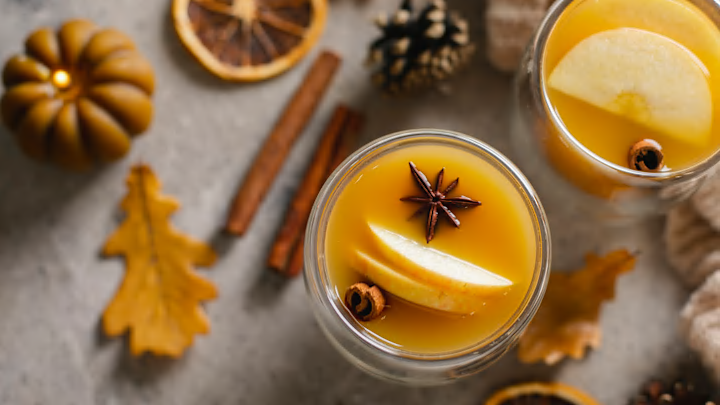In a time before pumpkin spice went overboard with its marketing, people associated fall with fresh apples. Crisp and juicy, they practically beg to be crushed and pulped into liquid. But what’s the difference between apple juice and apple cider?
Both apple juice and apple cider are fruit beverages. But apple cider is raw, unfiltered juice—the pulp and sediment are intact. To make cider, the apples are ground into an applesauce-like consistency, then wrapped in cloth. A machine squeezes the layers and strains out the juice into cold tanks. That’s the cider that ends up on store shelves.
Apple juice, on the other hand, takes things a step further—removing solids and pasteurizing the liquid to lengthen its shelf life. It’s typically sweeter, possibly with added sugar, and may lack the stronger flavor of its relatively unprocessed counterpart. It’s also often lighter in color, since the remaining sediment of cider can give it a cloudy appearance.
Each state allows for a slight variation in what companies are allowed to call apple cider versus apple juice. The cider may be pasteurized, or the cider and juice may actually be more or less identical. One company, Martinelli’s, states in its company FAQ that their two drinks are the same in every way except the label: "Both are 100 percent pure juice from U.S. grown fresh apples. We continue to offer the cider label since some consumers simply prefer the traditional name for apple juice."
The U.S. Apple Association, a nonprofit trade organization that represents growers nationwide, indicates that apple juice can be made from concentrate, which is why you might see water as the first ingredient on the label. Generally, cider is the pure stuff: Crushed apples with minimal processing. Because it can ferment, it's usually found refrigerated. Apple juice can often be found elsewhere in stores, where it can remain stable.
Which you should buy comes down to personal preference. Typically, though, recipes calling for apple cider should use apple cider. Processed juice may be too sweet an ingredient. And you can always try making a pumpkin spice hot apple cider, although we may stop talking to you if you do.
Have you got a Big Question you'd like us to answer? If so, let us know by emailing us at bigquestions@mentalfloss.com.
Discover More Food Facts:
A version of this story was published in 2018; it has been updated for 2024.
